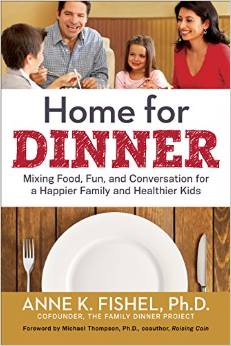Get Everyone “Home For Dinner” With This New Book!
 The Family Dinner Project’s own co-founder and team member, Dr. Anne Fishel, is an Associate Clinical Professor of Psychology at the Harvard Medical School and the Director of the Family and Couples Therapy Program at Massachusetts General Hospital. She has lectured and written about the benefits of family meals, including her popular “Food for Thought” column on this site and now a new book entitled “Home for Dinner: Mixing Food, Fun and Conversation for a Happier Family and Healthier Kids.”
The Family Dinner Project’s own co-founder and team member, Dr. Anne Fishel, is an Associate Clinical Professor of Psychology at the Harvard Medical School and the Director of the Family and Couples Therapy Program at Massachusetts General Hospital. She has lectured and written about the benefits of family meals, including her popular “Food for Thought” column on this site and now a new book entitled “Home for Dinner: Mixing Food, Fun and Conversation for a Happier Family and Healthier Kids.”
In honor of the book, team member Bri DeRosa sat down with Dr. Fishel to find out a bit more about her, her work and her family’s dinner routines.
Bri: I don’t want to spoil a good read for anyone, so without getting too specific, I’ll just say this: In the book, you talk quite a bit about your food memories and your own experiences with family dinners. If you had to sum up the impact family dinner has had on you in just five words, what would they be?
Dr. Fishel: An hour can be transformative.
Bri: Family dinners seem to be a hot topic lately. A number of people have written books and articles both for and against it. What made you decide that this was the right time for you to add your voice to the conversation with this particular book?
Dr. Fishel: With my own children and with the families I work with in therapy, I’ve seen the importance of family dinners to create connection, enjoyment and stability. As time gets chipped away by longer hours at work, the pull of technology and busy afterschool activities, I felt more and more passionate about the need to preserve this time around the table.
Much of the conversation about family dinners has focused on food and while I love to cook, I believe that you can dislike cooking and still love family dinners. Food brings us to the table, but it is the laughter, conversation and stories that keep us there. I wanted to write a book that helped families unlock the benefits of family dinners, whether they were “foodies” or not. I wanted to create a well-stocked pantry of ideas that a parent could reach for to supplement whatever they were already doing: to get games to play at the table, advice about deepening and expanding conversation, tips about how to tell stories, clinical tales to inspire ways to make change at the table and ideas to interest kids in activism that starts at the table.
With family time so tight, I wanted to offer ways to make the most of it. I hadn’t read a book that combined all these elements. I would have found such a book helpful as a young mother and hope this book will be a useful resource to all types of parents.
Bri: There are skeptics out there who would say it’s perfectly possible to raise smart, healthy, well-adjusted kids without any kind of rituals or routines around family mealtimes. What would you say to those people?
Dr. Fishel: I’m sure that’s true for some families, particularly if they create other types of rituals. Kids and adults need rituals to create stability, a family identity and a sense of belonging. For most of us, dinnertime is the most reliable time of the day to hang out together; there are few other settings where the family gathers.
If we still farmed together each morning, rehearsed in string quartets every afternoon and told stories while quilting together on the front porch, dinner wouldn’t be so important. But it is the number one time that families report that they connect with each other, with carpooling in second place.
Bri: What was the hardest thing about writing this book?
Dr. Fishel: The time pressure of getting it written in a year while still teaching, seeing patients and working with The Family Dinner Project. I am very grateful to the many “snow days” of the 2013-2014 winter season that allowed me to write in my pajamas undistracted.
Bri: So…with your children grown, do you still have routine family dinners? What does family dinner look like in your house these days?
Dr. Fishel: It took me years after my children flew the coop not to feel wistful around dinnertime, though at first my husband and I pretended that this new freedom was great—snacking on cheese and crackers until we lost our appetite for dinner and sometimes eating in front of the TV. Eventually, we settled into a new rhythm of eating at more varied times of the night than we used to, and eating way down the food chain.
I make a much smaller repertoire of dinners now, relying on meals that are very quick and require no recipes. When my sons were home, they loved trying new foods, and they were willing to help or take the lead in the kitchen. Without them home, I make meals that I can whip up in about 15 minutes—baked eggs over spinach, black bean burgers, and crab cakes. And, one thing I never would have gotten away with—my husband and I will eat the same soup three nights in a row. Every night, in addition to discussing our days and the news, one of us will ask, “What do you think our boys are doing right now?”
“Home for Dinner: Mixing Food, Fun and Conversation for a Happier Family and Healthier Kids” is available now!
